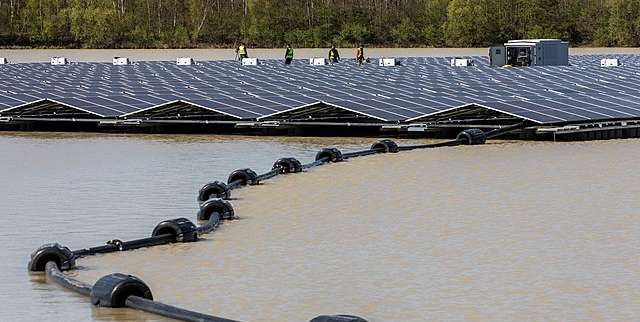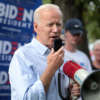Although the relationship between conservatism and solar energy has historically been contentious, some conservatives, like Weld County Commissioner Lori Saine (R-Dacono), see solar power as a key part of a “free-market” energy economy — as well as a step on the path to energy independence.
In early December, the American Legislative Exchange Council (ALEC), an organization of state legislators that espouses free market principles and federalism, unanimously passed “The Resolution in Support of Farming and Energy Production” at its States & Nation Policy Summit in Washington, D.C. Introduced by Saine, the resolution advocates for the permitting of community solar and agrivoltaics projects on farmland. Proponents of the measure hope it will spur consumer choice and energy options to help family farmers and increase domestic energy production.
Agrivoltiacs, or agrisolar, is the practice of using the same land you use for traditional agricultural practices for the production of solar energy.
“American farmers and ranchers deserve to have choices about how they produce energy on their farmlands,” Saine said in support of the resolution. “Small-scale community solar and agrivoltaics can play an important part in our national energy future, providing opportunities for farmers and keeping farmland in production. We have seen firsthand in Colorado the positive impact these types of projects have in preserving our agricultural communities and I urge conservatives around the nation to embrace it.”

Weld County has already seen a push for improved solar capabilities. A project funded through the federal Department of Energy moved forward earlier in the year with plans in Fort Lupton to replace a diesel-powered generator that powers a water purification plant with a solar-powered one.
Saine admits that she is somewhat of an unlikely ally for the burgeoning solar industry, especially considering she received several zero scores from environmentalist groups when she was in the state Legislature. Saine said in an interview that she thinks some of the conservative opposition to solar and other forms of renewable energy was coming from partisanship.
“My own journey on this began in 2021 when I had farmers approach me as a commissioner to tell me they needed more fairness when it comes to this type of energy production on farmland,” Saine said. “I did face pushback from some of my constituents; the two main things I was hearing in opposition were, ‘Oh, this is just going to be giving money to Joe Biden,’ and that some people just thought that solar panels were ugly.”
Saine, who ran unsuccessfully for Congress in 2022, worked to find a way to bridge that gap between the solar advocates and skeptics in her rural community. She sees solar as a way to meet the needs of Weld County.
“This is really exciting as a burgeoning industry, just five years ago solar panels were effective at about 15%, now they’re about 25%. We have really seen massive leaps in technology over the past few years, and we’re excited that Weld County can be a national leader on this front,” said Saine.
The measure provides what advocates call an “actionable path forward” for counties and localities considering the adoption of community solar and agrivoltaics. According to the resolution, “Solar facilities on unproductive or nonproductive farm ground can provide passive income for farmers to weather adverse events or uncertainty,” and “Solar production and agrivoltaics can also help young farmers afford to buy land for farming production.”
Larry Ward, the president and CEO of Conservatives for a Clean Energy Future, was optimistic about the prospects of community solar being embraced by the conservative movement.
“Conservative policymakers across the country are embracing community solar as an opportunity to prioritize economic development and increase consumer choice,” Ward said. “We are hopeful that this ALEC resolution will encourage more conservative lawmakers to explore how community solar can promote energy freedom and prosperity in their counties.”
As it currently stands, 19 states and D.C. have policies in place that allow for third-party community solar development. Multiple state legislatures are advancing bills to enable these new programs, including Republican-sponsored legislation in states like Wisconsin, Iowa, Ohio, Missouri, Georgia, and Pennsylvania.
Research from the Conservative Energy Network has found that 60% of Republicans and 65% of Independents support community solar. For conservatives, the growing support for community solar has to do with more competition and freedom in the energy market than for anything related to climate. Support typically comes for economic reasons. Conservative states are currently the largest producers of wind energy and often lie in what is called by those in the energy industry as the “wind belt” in the Midwest. Conservatives in these states have seen a sizable return on investment in wind power, for both the state and local landowners, and have provided rural communities and agricultural centers with a reliable source of energy.
“Conservatives should hold on to free market values. Nothing in this resolution prescribes who should operate the companies or how one gets financial incentives. Just energy choice,” Saine concludes. “Conservatives should hold on to free market values even when it isn’t popular, because principles don’t change.”




